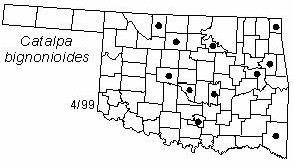Tree to 15 m (50 ft) tall and 50 cm (20 in) in diameter with rounded open crown. Bark thin, brownish gray, scaly. Twigs thick, green becoming brown, usually glabrous, with large leaf scars usually in threes. Buds very small, pale brown, rounded, usually three at a node, no end bud. Leaves in a whorl of three or opposite, long-petioled, cordate, acuminate, entire, ovate, 13-25 cm (5-10 in) long and 10-18 cm (4-7 in) wide, glabrous dull green above, paler and soft-hairy below. Flowers white with purple spots and orange stripes, fragrant, bell-shaped, about 4 cm (1.6 in) long and wide, numerous in panicles at ends of leafy twigs in late Spring. Fruits long thin cylindrical capsules, green becoming brown, 15-30 cm (6-12 in) long and about 1 cm (0.4 in) in diameter, maturing in Fall.
Distribution: The original range is uncertain, now naturalized in much of the eastern U. S.
Habitat: Roadsides, abandoned fields, old homesites.
NWI status: UPL
Comment:Both species of catalpa have been widely planted as shade trees and in shelterbelts, and have become established in most of Oklahoma. Catalpa is derived from an Indian name; bignonioides refers to the flowers, which resemble those of Bignonia.
Distribution in Oklahoma: 
BACK
NEXT
RETURN TO INDEX
Last update: 9/9/99
 Go to Oklahoma Biological Survey Home Page
Go to Oklahoma Biological Survey Home Page
 Disclaimer
Disclaimer